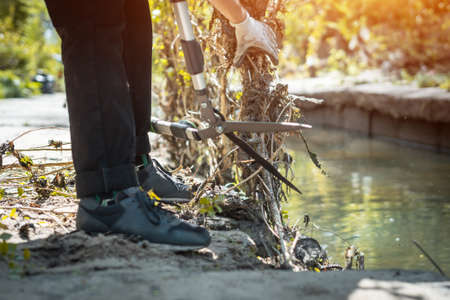Introduction to Sustainable Waste Management in British Campsites
Across the sweeping moors, dense forests, and rugged coastlines of Britain, camping is more than just a pastime—it’s a cherished tradition woven into the fabric of British culture. However, as more adventurers pitch their tents in these stunning locations, the issue of waste disposal becomes increasingly pressing. Effective, eco-friendly waste management isn’t merely about keeping campsites tidy; it’s about safeguarding the UK’s natural beauty for future generations. The improper handling of rubbish—whether plastic packaging, food scraps, or discarded equipment—not only spoils the landscape but threatens local wildlife and contaminates delicate ecosystems. For campsites striving to balance visitor enjoyment with environmental responsibility, innovative waste disposal solutions are essential. By adopting sustainable practices tailored to Britain’s unique environment and cultural heritage, campsite operators can set new standards for eco-conscious outdoor living and inspire campers across the country to tread lightly on the land they love.
Current Waste Challenges in Campsite Environments
Campsites across Britain, from the rugged Highlands to the rolling hills of the Cotswolds, are increasingly under pressure due to waste management issues. The unique character of British campsites—often nestled in protected countryside or along scenic coastlines—means that the impact of improper waste disposal is both immediate and long-lasting. Littering remains a persistent problem, with items like plastic bottles, food wrappers, and disposable barbecues marring otherwise pristine landscapes. The limited recycling infrastructure in many rural locations compounds this issue, making it difficult for campers and site managers alike to separate and process recyclable materials effectively.
Common Waste Issues on British Campsites
| Waste Challenge | Description | Impact on Environment |
|---|---|---|
| Littering | Improper disposal of packaging, single-use plastics, and food waste | Harms wildlife, pollutes water sources, spoils natural beauty |
| Recycling Limitations | Lack of segregated bins and local recycling facilities | Increases landfill use, reduces resource recovery rates |
| Human Activity Impact | High footfall during peak season leads to excess rubbish and strain on waste systems | Erodes habitats, disturbs flora and fauna, increases maintenance costs for site owners |
The Reality for Campers and Site Operators
For many British campers, the challenge is twofold: not only must they pack out what they bring in, but they also grapple with insufficient or confusing waste disposal points. Site operators, meanwhile, face mounting pressure to maintain environmental standards while managing costs and resources. This creates a pressing need for innovative solutions tailored to Britain’s diverse camping environments—solutions that go beyond traditional bin collections and encourage responsible behaviour from every visitor.

3. Innovative Technology and Methods for Waste Reduction
Across Britain’s diverse campsites, the push towards eco-friendly practices has spurred the adoption of advanced waste disposal technologies uniquely suited to local conditions.
Compost Loos: Turning Human Waste into Resource
Composting toilets, or “compost loos” as they’re known in the UK, have emerged as a game-changer for remote and rural campsites. These waterless systems use natural decomposition processes to break down human waste into usable compost, drastically cutting water usage and eliminating chemical treatments. Modern designs cater to British weather—ventilated for damp conditions and robust enough to withstand heavy use during busy camping seasons.
Portable Recycling Stations: Flexible Solutions for All Sites
Traditional recycling can be tricky in transient environments, but portable recycling stations are revolutionising the approach on British sites. These modular units can be easily deployed and moved as needed, offering separate bins for plastics, glass, metals, and organics. Clear labelling with familiar British recycling symbols ensures campers know exactly where their waste belongs, supporting nationwide recycling targets even when miles from the nearest town centre.
Smart Bins: Data-Driven Waste Management
The latest innovation hitting eco-conscious campsites is the smart bin—a high-tech solution equipped with sensors to monitor fill levels and optimise collection routes. Some models even compact rubbish automatically, reducing overflow and unsightly messes common in high-traffic areas. By leveraging real-time data, campsite operators can streamline collections, cut fuel consumption on collection vehicles, and ensure pristine pitches for all visitors.
These cutting-edge solutions are not just about managing rubbish—they represent a cultural shift towards responsible outdoor living that aligns perfectly with Britain’s growing environmental awareness. From the Lake District to Cornwall’s coastlines, embracing these innovations means cleaner sites, happier campers, and a lighter footprint on our cherished landscapes.
4. Local Engagement and Community-Based Initiatives
Innovative waste disposal solutions at eco-friendly campsites in Britain cannot thrive without the active participation of all stakeholders. Campers, site operators, and local councils each play a pivotal role in fostering sustainable waste practices that align with both environmental goals and local community values.
Roles and Responsibilities in Sustainable Waste Management
| Stakeholder | Key Responsibilities | Examples of Involvement |
|---|---|---|
| Campers | Adhering to site-specific waste protocols, segregating rubbish, minimising single-use plastics, and participating in on-site recycling schemes. | Bringing reusable containers, sorting food waste into compost bins, reporting improper disposal. |
| Site Operators | Providing clear signage, adequate facilities for recycling and composting, educational materials, and regular maintenance of waste stations. | Hosting workshops on zero-waste camping, collaborating with local upcycling initiatives, ensuring transparent communication about disposal procedures. |
| Local Councils | Enforcing regulations, supporting infrastructure upgrades, facilitating collection services, and incentivising green initiatives. | Funding waste audits, promoting joint clean-up events, offering grants for sustainable technology adoption. |
The Importance of Collective Action
A coordinated approach among all parties amplifies the impact of innovative solutions. For example, when councils collaborate with campsite operators to introduce smart bin systems or trial community composting projects, the likelihood of long-term success increases. Meanwhile, campers educated about local wildlife and environmental sensitivities are more inclined to respect rules around litter and hazardous waste disposal.
Case Study: Community-Led Recycling Schemes in Cornwall
Campsites across Cornwall have piloted joint ventures with parish councils to roll out colour-coded bin systems and host regular litter-picking sessions involving both visitors and locals. This not only improves recycling rates but also strengthens ties between campers and permanent residents—nurturing a culture where everyone takes pride in protecting the countryside.
Key Takeaways for Eco-Friendly Campsite Waste Management
- Communication: Clear guidance ensures proper use of innovative systems like solar-powered compactors or bio-digesters.
- Incentives: Recognition schemes (such as “Green Camper” badges) motivate responsible behaviour.
- Feedback Loops: Regular feedback from users helps refine processes and tailor solutions to specific regional needs.
Sustainable waste management at British campsites is not just about technology—it’s a shared responsibility rooted in strong local engagement. By working together, campers, operators, and councils can turn innovative disposal solutions into everyday practice across the UK’s cherished natural landscapes.
5. Case Studies: British Campsites Leading the Way
Profile of Pioneering Eco-Friendly Sites
Across Britain, a growing number of campsites are setting the benchmark for innovative waste disposal. Sites like Downshire Camping & Caravanning Park in Northern Ireland have introduced comprehensive recycling stations paired with on-site composting facilities, drastically reducing landfill contributions. Similarly, Wild Meadow Campsite in Powys has adopted solar-powered compactors and encourages zero-waste camping by offering refill points for essentials and banning single-use plastics.
Successful Strategies Employed
The best-in-class sites share several effective strategies. First, they prioritise clear signage using local dialects and graphics, ensuring all visitors understand proper waste separation protocols. Next, they partner with regional waste management firms that specialise in environmentally sensitive disposal—such as collecting food scraps for local anaerobic digestion plants, turning waste into bioenergy. Many also provide biodegradable rubbish bags and make use of “leave no trace” educational sessions for campers, instilling responsible habits from the outset.
Lessons Learned from the Frontline
A key lesson emerging from these leading sites is the importance of community involvement. At Trellyn Woodland Camping in Pembrokeshire, regular workshops invite campers to suggest improvements or take part in litter picks, fostering a sense of stewardship over the land. Moreover, transparency about where waste goes after collection—through digital dashboards or noticeboards—has boosted compliance and reduced contamination rates. These successes prove that combining smart infrastructure with public engagement creates a replicable model for eco-friendly camping across Britain.
6. Practical Tips for Campers to Minimise Waste
Pack With Purpose
Before heading out to any British campsite, careful packing is your first line of defence against unnecessary waste. Opt for reusable containers and water bottles instead of single-use plastics. Choose foods with minimal or recyclable packaging and pre-portion snacks at home. Avoid overpacking by making a checklist—less gear means less to discard or manage.
Sort and Separate Rubbish On-Site
Most innovative eco-friendly campsites across Britain now provide clearly labelled bins for recycling, composting, and landfill. Familiarise yourself with the local sorting guidelines upon arrival. Assign separate bags or containers in your camp setup for each waste type. Take a few moments after every meal or activity to properly dispose of rubbish; this keeps your site tidy and supports the sites sustainable initiatives.
Embrace Leave-No-Trace Principles
The British countryside is famed for its natural beauty, so it’s only right we keep it that way. Follow leave-no-trace principles: pack out what you pack in, including food scraps and biodegradable items—wildlife can be harmed by even seemingly harmless leftovers. Stick to established paths to avoid trampling vegetation, and if you encounter litter left by others, do your bit by picking it up.
Smart Refuse Reduction Techniques
- Bring reusable cloths instead of kitchen roll or wet wipes
- Avoid disposable BBQs—opt for campsite-approved fire pits or reusable grills
- If using soap, choose biodegradable brands and wash dishes away from water sources
Respect the Local Environment
Finally, always check campsite rules regarding waste disposal and adhere to any special requests. Remember that many rural sites depend on visitors’ diligence to maintain their eco-friendly status. By planning ahead and acting responsibly, you help ensure Britain’s campsites remain clean, green havens for years to come.
7. The Future Outlook for Eco-Friendly Campsites in Britain
As the British outdoor community becomes increasingly conscious of its environmental impact, the future of waste disposal at campsites is set to undergo significant transformation.
Emerging Trends in Sustainable Camping
Britain’s eco-friendly camping scene is rapidly adopting innovative technologies such as smart waste bins that monitor fill levels and mobile app integration for waste collection scheduling. Composting toilets, solar-powered compactors, and advanced recycling stations are becoming mainstream, particularly at sites catering to environmentally savvy campers who expect higher sustainability standards.
The Influence of Policy and Regulation
With governmental pressure mounting through initiatives like the Resources and Waste Strategy, campsite operators are being nudged towards more rigorous compliance with environmental regulations. Local councils across the UK are rolling out incentives for sites that implement closed-loop waste systems, while punitive measures against improper disposal are growing stricter. Expect tighter controls on single-use plastics and increased funding for green infrastructure at popular camping destinations.
Changing Attitudes: British Campers Lead the Way
The evolving relationship between British campers and sustainable waste management cannot be overstated. Today’s campers are not just passive participants; they’re active agents of change, demanding eco-friendly facilities and holding sites accountable via online reviews and social media. Educational campaigns from organisations like Keep Britain Tidy have instilled a culture where leaving no trace is now a badge of honour among seasoned wild campers and families alike.
Looking ahead, a blend of technology, policy intervention, and grassroots enthusiasm will define the next era of waste disposal solutions at Britain’s campsites. As these forces converge, expect to see a new gold standard where sustainable practices aren’t just encouraged—they’re seamlessly woven into every aspect of the British camping experience.


